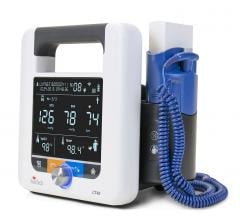July 9, 2008 – An article in the July issue of The Journal of Clinical Hypertension indicates an increased intake in minerals such as potassium, and possibly magnesium and calcium by dietary means, may reduce the risk of high blood pressure and reduce the risk of heart disease and stroke.
Potassium, specifically, has been hypothesized as one reason for the low cardiovascular disease rates in vegetarians, as well as in populations consuming primitive diets (generous in potassium and low in sodium). In isolated societies consuming diets high in fruits and vegetables, hypertension affects only 1 percent of the population, whereas in industrialized countries that consume diets high in processed foods and large amounts of dietary sodium, one in three people have hypertension. Americans consume double the sodium and about half of the potassium that is recommended by current guidelines.
According to the paper, if Americans were able to increase their potassium intake, the number of adults with known hypertension with blood pressure levels higher than 140/90 mm Hg might decrease by more than 10 percent and increase life expectancy. Similar studies show that diets high in magnesium (at least 500 to 1,000 mg/d) and calcium (more than 800 mg/d) may also be associated with both a decrease in blood pressure and risk of developing hypertension. Data regarding these minerals, however, are not definitive.
“If we were to achieve the correct potassium/sodium ratio through dietary means, there would be less hypertension and cardiovascular disease in the population as a whole,” says Mark C. Houston, M.D., author of the study.
Diets that emphasize fruits, vegetables and low-fat dairy products, including the landmark Dietary Approaches to Stop Hypertension (DASH) trial, have been advocated by the Joint National Committee on Prevention, Detection, Evaluation, and Treatment of High Blood Pressure, the American Heart Association, the European Society of Hypertension, the World Health Organization and the British Hypertension Society.
Hypertension is the leading cause of cardiovascular disease, affecting approximately 1 billion individuals worldwide and is the most common reason for visits to physician’s offices and the primary reason for prescription drug use.
More than 70 million Americans, or nearly one in three adults, are estimated to have hypertension, but fewer than 50 percent achieve blood pressure control. Nearly 70 million more adults have high-normal or pre-hypertensive blood pressure levels of 120/80 mm Hg to 130/85 mm Hg, and 90 percent of adults will probably develop hypertension by age 65. Poor blood pressure control is a major challenge for patients with diabetes and chronic kidney disease. Despite major advances in the prevention and treatment of hypertension over the past decades, with a decrease of more than 60 percent in hypertension-related strokes, hypertension remains an important public health challenge.
For more information: www.blackwell-synergy.com/loi/jch.


 February 14, 2022
February 14, 2022 




